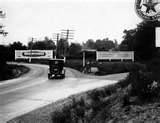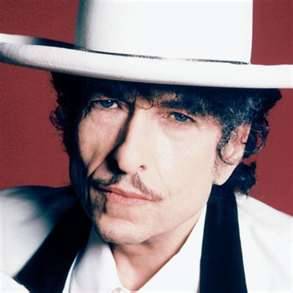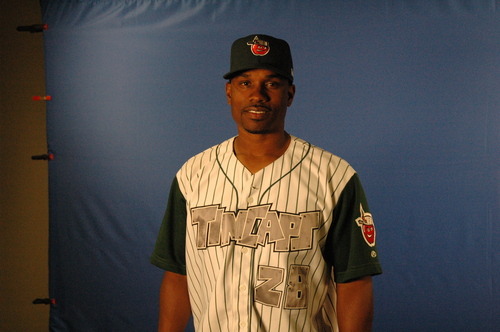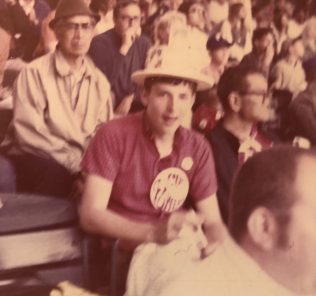Jacque Jones on All-Star Night

July 10, 2012—
FORT WAYNE. Ind..—-A road trip down the historic Lincoln Highway always takes you back in time.
America’s first coast-to-coast highway connected Times Square in New York City with the Pacific Ocean at San Francisco’s Lincoln Park. The Lincoln Highway (Route 30) rolls through downtown Fort Wayne and will celebrate its 100th anniversary in 2013.
While cruising in the way-back machine I ran into former Chicago Cub-Minnesota Twins Jacques Jones in Fort Wayne. This was the same player who befuddled Cubs fans in 2006 and 2007 but I miss him from today’s Cub standards.
Jones, 37, is in his first year as hitting coach for the Fort Wayne TinCaps.
He retired in the winter of 2010 after signing a minor league contract with the Twins, the team that chose him in the second round of the 1996 amateur draft.
But Jones was still Jonesin’ for the game.
He’s starting near the bottom rung of the minor league ladder with aspirations to become a manager. Jones chose to partner up with TinCaps parent San Diego Padres because San Diego is his home town.
“It’s the team I grew up watching,” he said in a mid-June interview before the TinCaps took on the Lansing Lugnuts at Parkview Field, where Bob Dylan will be playing his old Lincoln Highwayesque blues rock songs on Aug. 24.. “It’s been a good experience. I’m learning how to communicate and deal with different personalities.”

With a simple twist of fate, Jones will make it.
In my 2009 field guide “Cougars and Snappers and Loons (Oh My!)” I correctly predicted a managing career for former Cougar Mike Redmond when I interviewed him in the twilight of his career with the Twins. I feel the same vibe about Jones. He is honest, he has absorbed a wealth of information and is steadfast in his beliefs.
Jones has already managed two TinCaps games after manager Jose’ Valentin (former White Sox-Brewer) returned to Puerto Rico when his infielder son Jesumel was drafted in the first round by the Dodgers. “Even when Jose’ is here I play along with the game, ‘What would I do here?,’” Jones said during a scouting break on his laptop computer. “In the end I’d like to have a shot at managing.”
I saw Jones the day after the Cubs fired their storied hitting coach Rudy Jaramillo. Many said the Cubs wanted to achieve a higher OBP (On Base Percentage).
“OBP isn’t really important to me,” he said. “Getting a walk is fine. Hit by pitch is fine. But you’re not going to get runs in. What do you do in clutch situations? Are you knocking that run in or are you walking? Do you want your number four hitter to have a high on base percentage but no damage? Do you know what I mean?
“I want somebody who is going to do some damage. I’m a firm believer you are going to have a guy that walks 100 times in the lineup and a guy that strikes out 100 times and you mix and match.”

BTW, on the way home from Fort Wayne. tonight’s all-star game starter Matt Cain pitched a perfect game for the Giants. He struck out 14 batters, meaning that major league hitters are striking out at a record pace of 19.6 per cent of all plate appearances.
Jones hit .285 in each of his seasons with the Cubs. In 2006 He hit 27 HR and 81 RBI striking out 116 times in 578 AB with the Cubs. In 2007 those numbers dropped to 5-66, striking out 70 times in 453 AB.
As Jones embarks on his coaching-managing career he said he takes bits and pieces of things he learned from Kirby Puckett, Paul Molitor, Torri Hunter, David Ortiz, Aramis Ramirez and Derrek Lee. “Pitchers like Eddie Guardado and LaTroy Hawkins also taught me how to be a big leaguer,” he said.
Jones finished his career with a pretty nice .277 average with 165 HR and 630 RBI in 1,302 major league games.
“I learned how to deal with each and every at bat,” he explained. “You have to flush the bad and maintain the good. Don’t get too low when things aren’t going well. Don’t get too high when things are going good. Your teammates watch you. The media watches you. The fans watch you. You don’t want people to know when you’re going good or when you’re going bad. The mental part of the game is more strenuous than the physical part. You have to keep grinding.”
Is hitting more psychological or mechanical?
“Psychological by far,” Jones answered. “These kids dominated somewhere along the line or they wouldn’t be here. Most kids haven’t struggled. For a lot of them this is the first time they have had to make adjustments. That’s difficult for them. I’m here to let them know that I went through it, Torri went through it, it is a game of adjustments. They are attacking your weakness. Then you have to try and fix your weakness. Find another weakness, you gotta fix that one.”
Jones keeps in constant contact with his former Cubs manager Dusty Baker. He had just talked to him a week before our visit.
“He was an awesome manager, as even keel as you could be,” Jones said. “The time I was in Chicago I had never seen a man get as beat up as much as he got beat up in the press. Everything that happened was Dusty’s fault. Not the fact our payroll was nothing (2006 payroll: $94.4 million, Kerry Wood received $12 million to pitch in four games), we went through 30 something starting pitchers (including Springfield Illinois’ immortal Ryan O’Malley in 2006). It was terrible the way he was treated. But he kept his head up even when we lost 90 (96 in 2006). He had to have security walk him to his car. I learned so much from him and he carried himself in a manner which I very much respected.
“Chicago was tough.”
Every year around Jackie Robinson Day much is written about the dwindling numbers of African-Americans playing baseball. Then the subject drifts away for another year. “Of course,” Jones said. “At some point during the late ‘70s and early ‘80s it was 20 per cent African-Americans. Now it is around five and six per cent.”
According to MLB stats, the peak of of 27 per cent African Americans in the big leagues occurred in 1975 when Hall of Famers Joe Morgan, Hank Aaron, Reggie Jackson, Lou Brock, Frank Robinson, and Willie Stargell were household names.
“The game isn’t in the neighborhoods any more,” Jones said. “Kids play video games, basketball, football, but that stuff was around back then. I don’t understand it. I want to get as many African-Americans to get involved with baseball as I can. Now that I’m a coach I can go home (to San Diego) and try to get it back the way it was. ”
Jones grew up in the inner city of southeast San Diego.
His mother Linda worked in office management, his father Hardy worked for the City of San Diego. Hardy Jones died in 2004 at the age of 52.
Jones followed a baseball path out of his neighborhood from Little League to Pony League to high school to college at the University of Southern California. He was a member of the 1996 U.S. Olympic Baseball team.
“When I was in the big leagues I used to tell people it didn’t matter as much to me what organizations and fans said to me as much as when I went home,” Jones said. “My friends were able to tell me whether I had a good season or not. They know sports. When you come back to the neighborhood they let you know.”
I told you he is steadfast.
Jones doesn’t mind the often mindless, steadfast bus trips of the Midwest League.
“It’s awesome,” he said. “I’ve always been humble. I didn’t grow up in the lap of luxury. I always had to scuffle and work for whatever I got. The bus trips are three, four, maybe five hours. So what? Read a book. Go on the computer and do game reports. Read the newspaper.” This season Jones has already made his way through a Donnie Brasco book and “The Big Miss: My Years Coaching Tiger Woods” by the golfer’s former coach Hank Haney. When Jones peers out a bus window he still sees humility.
“I try to remember when I was a kid, what was asked of me, what was expected of me,” he said. “The main thing about me is that I don’t forget how hard the game was.”
After our thoughtful chat Lansing went out and beat Fort Wayne 7-0 before 4,650 fans at beautiful Parkview Field in downtown Fort Wayne.
It was the first time the Tin Caps had been shut out all season.
For archived baseball stories on Joe Garagiola, Lefty O’Doul, Buck O’Neil and more, visit the SPORTS section at davehoekstra.com







Leave a Response